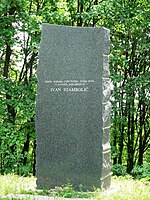8th session of the Central Committee of the League of Communists of Serbia
This session proved to be a turning point in the history of Serbia and Yugoslavia, as it marked the rise of Slobodan Milošević as the key force in Serbian politics.Following the death of Josip Broz Tito in 1980, Yugoslavia experienced an economic crisis and ethnic riots in the Socialist Autonomous Province of Kosovo.Despite this, some scholars and journalists, such as Dejan Jović, Jasna Dragović-Soso, Slaviša Lekić, and Zoran Pavić refer to Pavlović's removal as an internal coup d'état or a purge.After World War II, the Communist Party, under Josip Broz Tito's leadership, seized power and established a socialist state in Yugoslavia.[10] These riots have been interpreted by political scientist Dejan Jović as "the beginning of the deep state crisis in Yugoslavia, one that would lead to its dissolution".[11] Publicist and political analyst Zlatoje Martinov somewhat concurs, claiming that the constituent republicans throughout the 1980s evolved into "de facto states with their own armed forces".[20] Later that same year, Milošević entered politics after being appointed head of the Stari Grad SKS committee; he left his position as the director of Beobank in December 1983.[23] Miloš Vasić [sh], a journalist and co-creator of the Vreme magazine, described Milošević's actions as Stalinist, saying that he "talked about 'people's democracy', 'great steps forward in the service of socialism', no other Communist leaders used this jargon".The election's conduct was also criticised by most local party chapters, including the Belgrade and Novi Sad City Committees.[37] Previously at an electoral session in April 1986, Dragiša Pavlović, a reformist and Stambolić's ally, was elected president of the League of Communists of Belgrade City Committee, as Milošević's successor.[59] At a Central Committee of SKJ meeting in June 1987, Milošević proposed the "unification of the Republic of Serbia" and to strip away Kosovo's and Vojvodina's autonomous rights.[69] In his assessment, Pavlović highlighted the increasing prevalence of Serbian nationalism and underscored the significance of critiquing this ideology, pointing out its inability to address social issues or enhance inter-nationality events.[76] Pavlović called another session of the City Committee of Belgrade on 17 September where he tried to clarify his political position, stating "Inflammatory words bring nothing but fire.[78] The following day, on 18 September, a closed session of the presidency of the Central Committee of SKS was held, with Pavlović's comments at the press conference only on the agenda.[79][80] When officials tried to interpret his press conference differently and present him as being opposed to the policies of the presidency of the Central Committee of SKS, Pavlović denied the accusations that were made against him.[87] Zoran Sokolović, the secretary of the Presidency, wrote the opening word of the session, talking about Pavlović's comments and a SKS meeting related to media.[90] Milošević successfully managed to gain more votes partly due to receiving the backing of the JNA army generals represented in the Central Committee of SKS.[95] Because of the session's length, Mitević managed to manipulate the television broadcast by removing or delaying critical speeches of Milošević.[103] According to the authors Allan Little and Laura Silber, the session signalled the beginning of a "purge of everything from the Belgrade media to the head waiter at the Serbian government villa".[104] On the other hand, the Croat newspaper Vjesnik wrote that "the public can hardly see any essential political difference between those who remained in the Serbian leadership and those had left" because of the session.[107] Radoš Smiljković, a political science professor, was elected as Pavlović's successor as the president of the League of Communists of Belgrade City Committee.[109] On the proposal of Ante Marković, the future and last prime minister of Yugoslavia, Stambolić became the director of the Yugoslav Bank for International Economic Cooperation in November 1987.[112] During the 1990s, Stambolić remained critical of Milošević and cooperated with opposition politicians such as Žarko Korać, Rasim Ljajić, and Nenad Čanak.[117] According to witnesses on 25 August 2000, after Stambolić finished exercising in Košutnjak, a park-forest in Belgrade, he was thrown into a van while walking towards a restaurant.[125] Sejdinović claims that the consensus among historians and political scientists is that if Pavlović and Stambolić had won the power struggle, the history of Yugoslavia would have been different.[125] Political scientists Marc Hansmann, Elisabeth Bakke, and Ingo Peters said that the dissolution of Yugoslavia could have been "a less disastrous" if Milošević lost at the 8th session.[133] In 2017, RTS published a documentary, The 8th Session: Birth Of A Leader (Osma sednica: Rađanje vođe), in which Vllasi, Jevtić, Borisav Jović, Smiljković, and Trgovčević were interviewed.

Slobodan MiloševićIvan StambolićBelgradeSR SerbiaSFR YugoslaviaLeague of Communists of SerbiaCentral CommitteeSerbiaYugoslaviadeath of Josip Broz Titoethnic riotsSocialist Autonomous Province of Kosovopolitical reformistpresident of the SKS PresidencyDragiša PavlovićKosovo PoljepopulismParaćin massacreDušan MitevićDejan JovićSeptember 2000 general electionassassinatedWorld War IICommunist PartyJosip Broz Titosocialist stateCommunist Party of Serbia6th Congressdeath of Titoethnic nationalismausterityKosovo AlbanianLeague of Communists of KosovoUniversity of PristinaZlatoje MartinovFaculty of LawUniversity of Belgradeprotégéindustrial gasprime minister of Serbiaanti-nationalistStari GradtechnocratStalinistsocialismMirjana MarkovićPetar StambolićCentral Committee of the 12th SKJ Congressstate presidencyNikola LjubičićPresidency of the 12th SKJ CongressDušan ČkrebićPolitikaPolitika EkspresRadio Television of BelgradeDragoslav MarkovićpresidentPresidency of the SKJ Central CommitteeAzem Vllasipresident of the presidency of the Provincial Committeepresident of SerbiaAleksandar BakočevićSerbian Academy of Sciences and ArtsThe MemorandumVečernje novosti1974 Yugoslav ConstitutionAdam LeBorBrotherhood and unitypopulistKosovo SerbnationalistsTitoistsCentral Committee of SKJ meetingautonomous rightsBoško KrunićFederal Assembly of the SFRYYugoslav People's ArmyParaćinValjevoSuboticademocratic centralismBorisav JovićAssembly of SR SerbiaBranislav IkonićDesimir JevtićĐorđe StojšićLeague of Communists of VojvodinaState Security ServiceRadio Television of SerbiaAllan LittleLaura SilberThe Washington PostVjesnikAnte MarkovićYugoslav Bank for International Economic CooperationFederal Republic of YugoslaviaŽarko KoraćRasim LjajićNenad Čanak1991 protests in BelgradeSeptember 2000 Yugoslav general electionŠumadija CoalitionDemocratic Opposition of SerbiaKošutnjakOperation SabreFruška GoraSpecial Operations UnitVojislav Koštunicaoverthrow in October 2000social democracypolitical liberalisationBranka PrpaMilan KučanAl Jazeera BalkansUwe Backeszero hourŽivorad KovačevićAnti-bureaucratic revolution1989 Serbian general election14th Congress of the League of Communists of Yugoslavia1990 Serbian constitutional referendumBackes, UweVandenhoeck & RuprechtBanac, IvoCornell University PressTaylor & Francis